Kenneth Atchity's Blog, page 99
April 9, 2019
Amazon Top Picks Books by Kenneth Atchity!

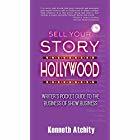 Sell Your Story to Hollywood: Writer's Pocket Guide to the... Kenneth Atchity List Price: $14.95 Price: $12.57 You Save: $2.38(16%) Learn more Add to Wish List
Sell Your Story to Hollywood: Writer's Pocket Guide to the... Kenneth Atchity List Price: $14.95 Price: $12.57 You Save: $2.38(16%) Learn more Add to Wish List 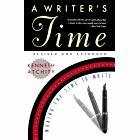 A Writer's Time: Making the Time to Write Kenneth Atchity List Price: $20.95 Price: $14.00 You Save: $6.95(33%) Ships from and sold by Zebra Express. Learn more Add to Wish List
A Writer's Time: Making the Time to Write Kenneth Atchity List Price: $20.95 Price: $14.00 You Save: $6.95(33%) Ships from and sold by Zebra Express. Learn more Add to Wish List 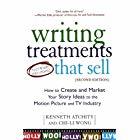 By Kenneth Atchity - Writing Treatments That Sell, Second... Kenneth Atchity Price: $14.64 Ships from and sold by Maria Figueroa. Learn more Add to Wish List
By Kenneth Atchity - Writing Treatments That Sell, Second... Kenneth Atchity Price: $14.64 Ships from and sold by Maria Figueroa. Learn more Add to Wish List 
Published on April 09, 2019 00:00
April 7, 2019
Writing Advice from Haruki Murakami

Take the old words and make them new again.
One of my all-time favorite jazz pianists is Thelonious Monk. Once, when someone asked him how he managed to get a certain special sound out of the piano, Monk pointed to the keyboard and said: “It can’t be any new note. When you look at the keyboard, all the notes are there already. But if you mean a note enough, it will sound different. You got to pick the notes you really mean!”
I often recall these words when I am writing, and I think to myself, “It’s true. There aren’t any new words. Our job is to give new meanings and special overtones to absolutely ordinary words.” I find the thought reassuring. It means that vast, unknown stretches still lie before us, fertile territories just waiting for us to cultivate them.

Published on April 07, 2019 00:00
April 4, 2019
Laura Joh Rowland's "Sano Ichirō " made Book Riot's list of 35 great historical fiction series
Sano Ichiro SeriesSano Ichiro, a samurai and private investigator for the shogun, in the 1600s in Edo, Japan:
Official webpage: http://www.laurajohrowland.com/booksBOOK 1 Shinju
Shinju
"Impressive . . . An eerie Japanese echo of Presumed Innocent."—Kirkus Reviews
"Serpico, meet James Clavell . . . Rowland is a sturdy, persuasive storyteller, and well worth keeping an eye on."—Washington Post Book World
"The year's most sparkling debut . . . one of its best novels . . . An unusual and exotic mystery . . . "—San Diego Union-Tribune
"Sano remains one of the great protagonists of the last few years." —Harriet Klausner, The Best Reviews
BOOK 2 Bundori
Bundori
BOOK 3 The Way of the Traitor
The Way of the Traitor
BOOK 4 The Concubine's Tattoo
The Concubine's Tattoo
BOOK 5 The Samurai's Wife
The Samurai's Wife
BOOK 6 Black Lotus
Black Lotus
BOOK 7 The Pillow Book of Lady Wisteria
The Pillow Book of Lady Wisteria
BOOK 8 The Dragon King's Palace
The Dragon King's Palace
BOOK 9 The Perfumed Sleeve
The Perfumed Sleeve
BOOK 10 The Assassin's Touch
The Assassin's Touch
BOOK 11 Red Chrysanthemum
Red Chrysanthemum
BOOK 12 The Snow Empress
The Snow Empress
BOOK 13 The Fire Kimono
The Fire Kimono
BOOK 14 The Cloud Pavilion
The Cloud Pavilion
BOOK 15 The Ronin's Mistress
The Ronin's Mistress
BOOK 16 The Incense Game
The Incense Game
BOOK 17 The Shogun's Daughter
The Shogun's Daughter
BOOK 18 The Iris Fan
The Iris Fan

Official webpage: http://www.laurajohrowland.com/booksBOOK 1
 Shinju
Shinju"Impressive . . . An eerie Japanese echo of Presumed Innocent."—Kirkus Reviews
"Serpico, meet James Clavell . . . Rowland is a sturdy, persuasive storyteller, and well worth keeping an eye on."—Washington Post Book World
"The year's most sparkling debut . . . one of its best novels . . . An unusual and exotic mystery . . . "—San Diego Union-Tribune
"Sano remains one of the great protagonists of the last few years." —Harriet Klausner, The Best Reviews
BOOK 2
 Bundori
BundoriBOOK 3
 The Way of the Traitor
The Way of the TraitorBOOK 4
 The Concubine's Tattoo
The Concubine's TattooBOOK 5
 The Samurai's Wife
The Samurai's WifeBOOK 6
 Black Lotus
Black LotusBOOK 7
 The Pillow Book of Lady Wisteria
The Pillow Book of Lady WisteriaBOOK 8
 The Dragon King's Palace
The Dragon King's PalaceBOOK 9
 The Perfumed Sleeve
The Perfumed SleeveBOOK 10
 The Assassin's Touch
The Assassin's TouchBOOK 11
 Red Chrysanthemum
Red ChrysanthemumBOOK 12
 The Snow Empress
The Snow EmpressBOOK 13
 The Fire Kimono
The Fire KimonoBOOK 14
 The Cloud Pavilion
The Cloud PavilionBOOK 15
 The Ronin's Mistress
The Ronin's MistressBOOK 16
 The Incense Game
The Incense GameBOOK 17
 The Shogun's Daughter
The Shogun's DaughterBOOK 18
 The Iris Fan
The Iris Fan
Published on April 04, 2019 09:25
April 3, 2019
WRITING ADVICE FROM HARUKI MURAKAMI

Read.
I think the first task for the aspiring novelist is to read tons of novels. Sorry to start with such a commonplace observation, but no training is more crucial. To write a novel, you must first understand at a physical level how one is put together.

Published on April 03, 2019 00:00
April 1, 2019
1,000-Year-Old Illustrated Manuscript of Herbal Remedies Available Online

Seeking natural remedies outside of chemical pharmaceuticals isn’t just for Eastern medicine. In fact, plant-based health cure also has a long tradition in Western medicine, as evidenced by a beautifully illustrated book in the British Libary’s collection. The Cotton MS Vitellius C III is a 1,000-year-old illustrated manual to plant pharmacology, and has now been digitized for online viewing.
The beautifully illustrated 11th-century book is filled with “herbals,” natural plant-based treatments to cure everything from body odor (simmer artichokes in wine) to easing chest pain (licorice root does the trick). Zooming in on the high-resolution scan, it’s incredible to see the Old English script and detailed drawings of the plants and animals used for their healing properties.
Though herbals were quite common in Anglo-Saxon medicine, the British Library’s manuscript is the only surviving illustrated Old English manual. “No one knows for sure how this manuscript was used or even where or by whom it was made,” project curator Alison Hudson shares. “Its production has been associated with monastic scriptoria at Canterbury and Winchester, due to its style of decoration and script, but this is by no means certain. Monasteries in those areas functioned both as centers of natural and supernatural healing and also as libraries and centers of learning.”
Each entry in the manual lists the plant’s or animal’s “name in various languages; descriptions of ailments it can be used to treat; and instructions for finding and preparing it.” And while it’s debatable as to how practical the guide really was—it includes plants like cumin.
Read more

Published on April 01, 2019 00:00
March 30, 2019
LOUISA MAY ALCOTT’S LETTER OF ADVICE TO A YOUNG WRITER
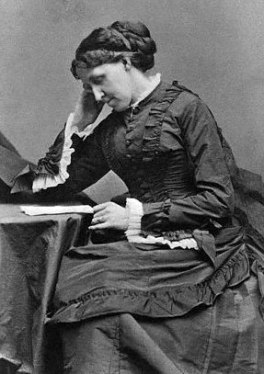
After the success of Little Women readers and aspiring writers began to send Alcott letters in droves. She replied to one of those writers with some valuable advice on Christmas Day, circa 1878:
My Dear Miss Churchill,
I can only say to you as I do to the many young writers who ask for advice—There is no easy road to successful authorship; it has to be earned by long & patient labor, many disappointments, uncertainties & trials. Success is often a lucky accident, coming to those who may not deserve it, while others who do have to wait & hope till they have earned it. This is the best sort & the most enduring.
I worked for twenty years poorly paid, little known, & quite without any ambition but to eke out a living, as I chose to support myself & began to do it at sixteen. This long drill was of use, & when I wrote Hospital Sketches by the beds of my soldier boys in the shape of letters home I had no idea that I was taking the first step toward what is called fame. It nearly cost my life but I discovered the secret of winning the ear & touching the heart of the public by simply telling the comic & pathetic incidents of life.
Little Women was written when I was ill, & to prove that I could not write books for girls. The publisher thought it flat, so did I, & neither hoped much for or from it. We found out our mistake, & since then, though I do not enjoy writing “moral tales” for the young, I do it because it pays well.
But the success I value most was making my dear mother happy in her last years & taking care of my family. The rest soon grows wearisome & seems very poor beside the comfort of being an earthly Providence to those we love.
I hope you will win this joy at least, & think you will, for you seem to have got on well so far, & the stories are better than many sent me. I like the short one best. Lively tales of home-life or children go well, & the Youth’s Companion is a good paying paper. I do not like Loring as he is neither honest nor polite. I have had dealings with him & know. Try Roberts Brothers 299 Washington St. They are very kind & just & if the book suits will give it a fair chance. With best wishes for a prosperous & happy New Year I am your friend.
L.M.A.
If Miss Churchill was expecting any discourse on how wonderful writing is, she was disappointed. But I love Alcott’s practical take: write what makes you money, because that’s how you’ll be able to provide for your family. It’s also notable that Alcott gives direct publishing advice, even an address. As far as Loring goes, this is most likely A. K. Loring, who published Alcott’s Moods in 1865, and then reissued it in 1870 after Little Women became a hit. And now I suppose I’ll have to go seek out their correspondence to see just how impolite he was.
Read more

Published on March 30, 2019 00:00
March 28, 2019
How to Option a Book for Film Adaptation
“In the motion picture business, nothing is more important than rights.”
–Prominent Business Affairs Executive

Hollywood has loved books ever since the days of silent films. It always will.
Sometimes you will hear grumblings from studio executives and producers that acquiring motion picture and television rights to books costs too much. They vow to cut back on it. Pay no attention to this babbling.
Hollywood’s love for books will endure for two simple reasons: First, books offer built-in wonderfully developed stories with fascinating plots and compelling characters; second, popular books (think the Harry Potter series as the ultimate example) have throngs of rabid fans (often teenagers and nerdy adults) who will be rushing to the box office to see the motion picture based on their beloved book. Five of the nine films nominated for this year’s Best Picture Oscar were based on books, including the winner, Argo. For these reasons, it is inevitable that you, the independent film producer, shall at some point want to acquire the motion picture and television rights to a book. This article will set forth the basic deal points of a book option agreement and hopefully provide some guidelines.
Read more of this post by veteran entertainment attorney Robert Zipser. It originally appeared on his official website.

–Prominent Business Affairs Executive

Hollywood has loved books ever since the days of silent films. It always will.
Sometimes you will hear grumblings from studio executives and producers that acquiring motion picture and television rights to books costs too much. They vow to cut back on it. Pay no attention to this babbling.
Hollywood’s love for books will endure for two simple reasons: First, books offer built-in wonderfully developed stories with fascinating plots and compelling characters; second, popular books (think the Harry Potter series as the ultimate example) have throngs of rabid fans (often teenagers and nerdy adults) who will be rushing to the box office to see the motion picture based on their beloved book. Five of the nine films nominated for this year’s Best Picture Oscar were based on books, including the winner, Argo. For these reasons, it is inevitable that you, the independent film producer, shall at some point want to acquire the motion picture and television rights to a book. This article will set forth the basic deal points of a book option agreement and hopefully provide some guidelines.
Read more of this post by veteran entertainment attorney Robert Zipser. It originally appeared on his official website.

Published on March 28, 2019 00:00
March 26, 2019
How To Be Productive: Understanding Time, Work and Creativity by Dr. Ken Atchity

Film Courage: One of your many books Ken is WRITE TIME? And in the forward you say that the world can be divided into two people, productive people and non-productive people. And you say that productive people have a love affair with time. I’ve love to know what makes someone on the right side of time and what make someone where time is their enemy?
Dr. Ken Atchity, Author/Producer: Well that’s a very good question put in a very intelligent way that makes it hard to get a handle on it because time is…time doesn’t really exist. Time is a human construct, we created time. Squirrels and chipmunks don’t have much idea of time. They know that the sun rises and the sun goes down and they know that it rains but they don’t think the way that we do and they don’t keep track of their birthdays for example, only humans do that. And it’s unfortunate because you’re only as old as you think you are. And that’s the way a squirrel looks at it and nobody is arguing with the squirrel about it but humans know better.
Some people look at time as the enemy and some people look at it as a friend. There is an old Spanish saying that is “There is more time than life,” which I always thought was a wonderful way of looking at it because that is what a productive person would say “there is more time than life.” And another Spanish or Italian saying says that “Life is short, but wide.” And that’s another way of productively looking at it. Like people say “How can you do as much stuff as you do?” Well that’s because that’s what I do. I don’t do anything else. And I used to give classes on time management and do a lot of studies on it, in fact WRITE TIME is filled with time management theories. And one of the things I noticed about people was they had no idea where their time went. And they go “I don’t know where you find all the time.” And I would say “I don’t know where you lose it.”
I mean we all have the same amount of time and they go “How much time do we have by the way? How much time is in a week?” And 2 out of 10 people can ask the question right off the top of their heads because they’ve never really multiplied 25 by 7 and realized exactly how many hours there are in a week.
Everybody has the same amount of time. So what I would do in a time management class at UCLA or elsewhere is I would say let’s chart your time this week. I just want you to make a chart of what you do with your time and let’s come in and talk about it next week when we come back together. And they would come back in and that was before I asked them how many hours there were in a week I would wait for the third week to ask that question.
And some people would come in with 98-hour weeks and some people would come in with 62-hour weeks and nobody seem to agree in general how many hours there were in a week because the hours they gave me didn’t add up, they didn’t make sense. They’d say “I sleep six hours a day.” But it turned out in the third week of analysis that instead of 6 hours a day they were actually sleeping 10 hours. They just were telling themselves they were sleeping 6 hours a day.
How much time do you spend talking on the telephone? Most people thought they maybe spent 15 minutes a day, when in fact it might be an hour a day. And watching television (of course). Some people said they were only watching an hour a day when they were actually watching three hours a day.
But a productive person knows exactly how long it takes to do something. Like when I write a screenplay or a book, I can tell you how many hours it takes to do it and so I know that I can get it done in a certain amount of time. Agatha Christie apparently wrote as many as 10 books a year. She had to use four or five pen names because she just kept writing. When you think about it writing is a function of how fast you type. Because I always say (in my writing book including that one) if you’re making a rule not to sit down to write if you don’t know what you’re going to write then you’ll never waste any time and you’ll never have writer’s block. So simply don’t sit down until you know what you’re going to write. It’s just a matter of how fast can you type. So it’s better to be walking along the beach thinking about the structure of your story then it is to be wasting a lot of time sitting in front of the computer typing stuff and throwing it away and all that stuff. Just figure it all out in your head. “Well what if I forget it?” Well guess what? If you forget it that’s probably good. You are forgetting forgettable things? You won’t forget it when it starts getting really good. Because then it will do what Faulkner said, it will start haunting you and you won’t be able to forget it and then you’ll just write it down.
William Saroyan was asked once how long it took him to write the Human Comedy because somebody had told the journalist it had took him three days and he said “No, it took me all my life to write it. It just took me a few days to type it out.”…(Watch the video interview on Youtube here).

Published on March 26, 2019 00:00
March 24, 2019
The last surviving member of the Babe Ruth Household by Jery Amernic
The oldest person I ever interviewed was Helge Ingstad, the famed Norwegian explorer who discovered the old Viking settlement at L’Anse aux Meadows, Newfoundland. That put to rest Christopher Columbus discovering America since the Vikings had beat him by 500 years. Ingstad was 100 years old when I met up with him at his home just outside Oslo, and he would pass away the following year.
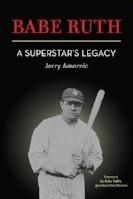
CLICK IMAGE TO PURCHASE – BABE RUTH - A Superstar's Legacy.
But of all the people I have ever interviewed the one who lived the longest was Julia Ruth Stevens, daughter of Babe Ruth. Julia, who passed away last week at the age of 102, was the last remaining member of the Ruth household.
She was a neat lady with a razor-sharp memory, keen sense of humor, and passion, especially where it concerned the man she called Daddy.
Portions of my lengthy interview with her when I spent an afternoon at her home are up on www.BabeRuthLegacy.com under Babe Ruth Legacy interviews. And as they say on CNN, it’s worth a listen.
Babe Ruth was a big part of Julia’s life until his death in 1948 when she was 32, and her insights into the kind of person he was are precious. She told me about the fun-loving, outgoing Babe who adored kids, who never had a chance to be one himself, and who just had this uncanny knack for doing everything he did … well.
He would wake her up at 5 a.m. when she was a young girl to join him for breakfast. Just the two of them. He taught her how to dance. He gave her his blood when she was in hospital and needed a transfusion. He gave her away when she got married. And, said Julia, “he would never fail to keep a promise.”
Maybe the funniest part of my time with her was when we were talking about the incredible value of Babe Ruth-signed baseballs, and the fact she didn’t possess any of those baseballs herself.
“The only signature I ever got was on a check,” she said, and then laughed.
You can tell a lot about people by their laugh. Julia’s laugh was one that said she enjoyed life, she enjoyed people, and she certainly liked having fun.
I am so glad I got to meet her.

CLICK IMAGE TO PURCHASE – BABE RUTH - A Superstar's Legacy.
But of all the people I have ever interviewed the one who lived the longest was Julia Ruth Stevens, daughter of Babe Ruth. Julia, who passed away last week at the age of 102, was the last remaining member of the Ruth household.
She was a neat lady with a razor-sharp memory, keen sense of humor, and passion, especially where it concerned the man she called Daddy.
Portions of my lengthy interview with her when I spent an afternoon at her home are up on www.BabeRuthLegacy.com under Babe Ruth Legacy interviews. And as they say on CNN, it’s worth a listen.
Babe Ruth was a big part of Julia’s life until his death in 1948 when she was 32, and her insights into the kind of person he was are precious. She told me about the fun-loving, outgoing Babe who adored kids, who never had a chance to be one himself, and who just had this uncanny knack for doing everything he did … well.
He would wake her up at 5 a.m. when she was a young girl to join him for breakfast. Just the two of them. He taught her how to dance. He gave her his blood when she was in hospital and needed a transfusion. He gave her away when she got married. And, said Julia, “he would never fail to keep a promise.”
Maybe the funniest part of my time with her was when we were talking about the incredible value of Babe Ruth-signed baseballs, and the fact she didn’t possess any of those baseballs herself.
“The only signature I ever got was on a check,” she said, and then laughed.
You can tell a lot about people by their laugh. Julia’s laugh was one that said she enjoyed life, she enjoyed people, and she certainly liked having fun.
I am so glad I got to meet her.

Published on March 24, 2019 00:00
March 21, 2019
A Dark Mirror | Dennis Palumbo with Barry Kibrick
A great interview with Dennis Palumbo and Barry Kibrick about how good crime fiction both reflects and reveals the society in which it is set. From Conan Doyle to Raymond Chandler to Gillian Flynn.


Published on March 21, 2019 00:00



